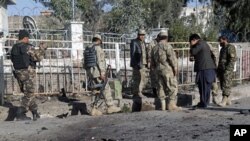A suicide bomber has killed at least two Afghan civilians and wounded four others after detonating explosives at the gates of the U.S. military base at Bagram, just north of Kabul.
The Taliban claimed responsibility for the bombing, saying it was revenge for the burning of Qurans several weeks ago at the Bagram Air Base.
NATO officials said no coalition troops were harmed in the attack and that the bomber did not breach the base.
In eastern Afghanistan, authorities say a suicide bomber killed a member of the Afghan security forces and wounded 11 others in an attack on a police checkpoint in the city of Jalalabad. No one immediately claimed responsibility for Monday's bombing.
When reports first surfaced February 20 of book burning at Bagram, violent anti-American protests erupted across Afghanistan, leaving at least 30 people dead and fraying relations between the U.S. and Afghanistan.
A prominent American newspaper said Saturday that a series of events led to the burning of Qurans and that the incident could have been stopped at several points "along a chain of mishaps, poor judgements and ignored procedures."
The New York Times quoted a U.S. official close to the joint Afghan-American investigation into the incident as saying at least six people involved in the Quran burning, including "American military leaders" and an American interpreter, could face disciplinary action.
The newspaper said about a week before the burning, military officers became concerned that detainees at a detention facility next to Bagram were secretly communicating through notes written in books from the detention center's library.
The Times reported two Afghan-American interpreters were told to sift through the books and set aside any that could pose a security risk. The interpreters identified 1,652 books for removal, including copies of the Quran and other religious books.
The Times quoted a U.S. official familiar with the joint investigation as saying the books should have been stored rather than burned.
The Times also cited Maulavi Khaliq Dad, a member of the Ulema Council, the pre-eminent body of Afghan religious leaders, which conducted its own inquiry into the incident. He was quoted as saying that some Afghan soldiers saw religious books in boxes awaiting removal. The soldiers told their commanding officer, but by the time he relayed his concerns to his American counterpart, the books were on their way to the incinerator.
The newspaper said both U.S. and Afghan officials believe the soldiers driving the books to the incinerator could not read Arabic and did not understand the significance of the holy books.
The New York Times said an Afghan worker "began to scream" when he realized the soldiers were burning holy Muslim books, and he and other Afghan workers tried to extinguish the fire with their water bottles.
The newspaper said "the Americans immediately stopped," but not before four books had been badly burned.
U.S. President Barack Obama and other U.S. officials have apologized for the Quran burning.
Some information for this report was provided by AFP and Reuters.




